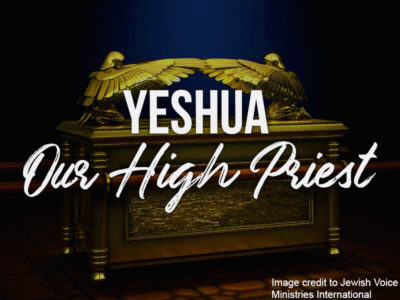Yom Kippur, the Day of Atonement, will be observed this year Tuesday evening through Wednesday evening, October 8-9. God commissioned Israel’s high priest on this most holy day to provide for the atonement of His people’s sins. For followers of Yeshua, who according to 1 Peter 2:9 are a royal priesthood, Yom Kippur can still be a day of intimate ministry to the Holy One in priestly intercession.
Yom Kippur, the 10th day of the 7th month of the biblical calendar, was the time set by God to meet with His people for the atonement, or covering, of their sins. (Lev. 16:29, 34) This could only be accomplished by Israel’s high priest, who was required to meticulously follow God’s detailed, specific instructions throughout the process. (Lev. 16:2-34, 23:26-32) As a result, Yom Kippur was a singularly sacred time between YHVH and the high priest.
Before the priest could act on behalf of God’s people, however, he had to make atonement for his own sins and those of his household. The stakes were high. Coming into God’s Presence was serious business, survivable only after an elaborate course of personal cleansing and covering. In addition, atonement had to be made for the Holy of Holies “because of the uncleanness and rebellion of the Israelites.” (Lev.16:16) So multiple sin coverings were needed. The entire process took a full day. This is consistent with the literal translation of the feast, “Day of Coverings.”
Against this back story, Yeshua was stunningly “sacrificed for sins once for all when He offered Himself.” (Hebrews 7:27) The blood of bulls and goats is no longer needed, or effective, to cover sin. The Messianic altar of atonement, the Cross, mediates for eternity the heights and depths of God’s love and grace for forgiveness of sin.
We dare not diminish the dazzling value of the Cross by seeking to re-engage with any system of sacrifice (including prideful self-effort) intrinsically denying its power.* At the same time, we need not entirely dismiss the value of observing Yom Kippur, either.
How can we rightly honor this special day with New Covenant integrity? To be sure, the matter is left to individual conscience. Those of us so stirred can observe the day as a Sabbath and hold a sacred assembly. (Lev.16:31) We can worship in thanksgiving for the ministry of Messiah Yeshua. We can fast (Lev.23:32), confess and repent of our sins, knowing He is faithful and just to forgive us. But there’s even more.
An often overlooked aspect of Yom Kippur relates to our role as a royal priesthood. Messiah is our High Priest and King of Kings, forever living to make intercession for us. (Hebrews 7:25) At the same time, we are joint heirs with Christ (Ro.8:17) and a royal priesthood. Therefore, on Yom Kippur, I hear His impassioned invitation to stand in the gap — with Him — in priestly intercession for His people. You could say I sense a type of open heaven for this purpose.
Keep in mind that Yom Kippur was a day of special intimacy between God and Israel’s high priest. It was the only day of the year he could enter the Holy of Holies, or come into YHVH’s close, personal presence. (Lev. 16:2) According to rabbinic teaching, it was also the only day the actual name of God was spoken aloud by the High Priest.
During Temple times in Israel, before making atonement for others, the high priest washed with water and dressed himself in sacred garments of linen. On Yom Kippur, you and I can intentionally put off self-striving, receive fresh cleansing by the Spirit, and “put on Christ”. (Ro.13:14, Gal.3:27) We can examine ourselves by the Spirit with sobriety and confess our sins Then, rather than offering God the blood of bulls and goats, we offer up Yeshua, partaking of His Body and Blood through the elements of Communion. Having been personally re-consecrated to YHVH, we can turn to the priestly call of intercession.
Traditional Judaism regards Yom Kippur as a depiction of judgment associated with the Day of the Lord. (Isa.13:9, Joel 3:12-14) For this and other reasons, many Messianic scholars view Yom Kippur as a prophetic foreshadow of Israel’s future salvation. Her national salvation is associated with Yeshua’s return and judgment of Israel and the nations. How appropriate, then, to approach Heaven’s Throne of Grace on Yom Kippur on behalf of Jewish people around the world.
Of them, Paul writes, “My heart’s desire and prayer to God for Israel is that they be saved.” (Ro.10:1) God’s heart longs for restored relationship with His ancient covenant people. Indeed, this was the very point of Yom Kippur! Christians around the world can engage with the heart of God on Yom Kippur through the ministry of intercessory prayer for Israel’s salvation.
Could the prophetic, priestly intercessory prayers of Gentile believers even be an aspect of the “fullness of the Gentiles” which must precede Israel’s salvation? “A partial hardening has come upon Israel until the fullness [not full number] of the Gentiles has come in; and in this way all Israel will be saved, as it is written, ‘The Deliverer shall come out of Zion. He shall turn away ungodliness from Jacob. And this is my covenant with them, when I take away their sins’.” (Ro.11:25-27, TLV, emphases and brackets mine)
As you and I pray for Israel on Yom Kippur, may the Spirit soften her “partial hardening.” May the day of her full, national salvation come quickly. Until then, let us encourage one another with the certain hope of Messiah’s return, most likely on a future Yom Kippur not too far from now. (1Thessalonians 4:16-18) Maranatha!
* For this reason, most Messianic Jews are not proactively supportive of the rebuilding of Israel’s Temple. Once the Third Temple is built, and animal sacrifice resumed, the atonement of Yeshua will seem more irrelevant than ever to the Jewish people.


